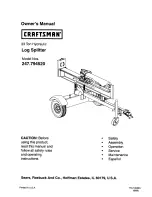
3. splitting wedge
4. support leg
5. log management
6. power switch
7. engine
8 wheels - only for short travel
9. hydraulic control lever
10. control lever
- vent screw
- oil drain plug with dipstick
PiCTOgramS
Pictograms and values on the product packaging:
a) Power consumption
b) Power supply values
c) Idle speed
d) Splitting force
e) Splitting diameter
USE aND OPEraTiON
ASIST equipment and machines are intended for
domestic or hobby use only.
The manufacturer and importer do not recommend
using this tool in extreme conditions and under high
loads.
Any additional requirements must be the subject of
an agreement between the manufacturer and the
customer.
Installation
The machine is designed for operation on level
surfaces and must be installed and fastened with
screws
to a stable and solid base with sufficient load-bearing
capacity.
If the wood is too hard or too large, but if the power
cord is too long (> 10 meters), the motor may
overheat.
Do not use a cable drum! risk of overheating
I - Power supply line 230V - 50Hz
Adapt your electrical protection to high-consumption
engine starting „
The electrical socket for powering your wood saw
must be protected by a 20 A two-pole circuit breaker.
Before working, the bleed screw should be loosened
a few turns until the air flows freely into and out of
the oil tank. The air flow passing through the vent
screw should be detectable during operation of the
splitter. Before moving the splitter, make sure that the
bleed screw is tightened to prevent oil from escaping
through this area.
IF THE BLEED SCREW IS NOT PERMITTED,
THE SEALED AIR WILL BE RESTRAINED IN
THE HYDRAULIC SYSTEM, COMPLETELY
COMPRESSED AND EXPANDS. REPEATED
COMPRESSION AND OPENING CROSSES THE
SEAL OF THE HYDRAULIC SYSTEM AND CAUSES
PERMANENT DAMAGE TO THE SPLITTER.
The maximum pressure has been set, and the
adjusting screw is sealed to ensure that the splitter
will not operate at a pressure greater than 8 tons. The
adjustment was performed by a qualified mechanic
using professional tools. Unauthorized readjustment
will cause the hydraulic pump to fail to develop
sufficient splitting pressure or WILL RESULT IN
SERIOUS INJURY AND SUCH DAMAGE TO THE
MACHINE.
WOrKiNg WiTH THE SPLiTTEr
Switching on and off
To start the splitter, press the switch / p1 / to position
I,
The splitter is equipped with a control system that
requires control with both hands of the user - the left
hand controls the hydraulic control lever / p2 /, while
the right hand controls the control lever / p3 /.
The working piston / p4 / starts to move towards the
splitting wedge.
The splitter does not work when one of the hands is
not in use. Only after both hands have released the
control does the working piston begin to return to its
initial position.
A latch lock is used to prevent accidental depression
of the hydraulic control lever.
Never allow the splitter to hold pressure for more than
5 seconds when trying to split too hard wood.
After this time, the pressurized oil overheats and
the machine could be damaged. In the case of such
extremely hard logs, turn them 90 ° to see if they can
be split in another direction. In any case, if you are
not able to split the log, it means that its hardness
exceeds the capacity of the machine and therefore
that it should be set aside to protect the splitter.
Always place the logs firmly on the guide plates and
work surface. Make sure they do not twist, wobble or
slide when splitting. Do not strain the knife on the top
of the knife. This will break the blade or damage the
machine.
Cut the logs in the direction of fiber growth. When
splitting, do not place them across the splitter. This
could be dangerous and seriously damage the
machine. Do not try to split two logs at the same time.
One of them could fly out and hit you.
RELEASE OF JAMED BLOCKS
• Release both controls.
• After the working piston returns and comes to a
complete stop in its initial position, insert a wooden
62










































